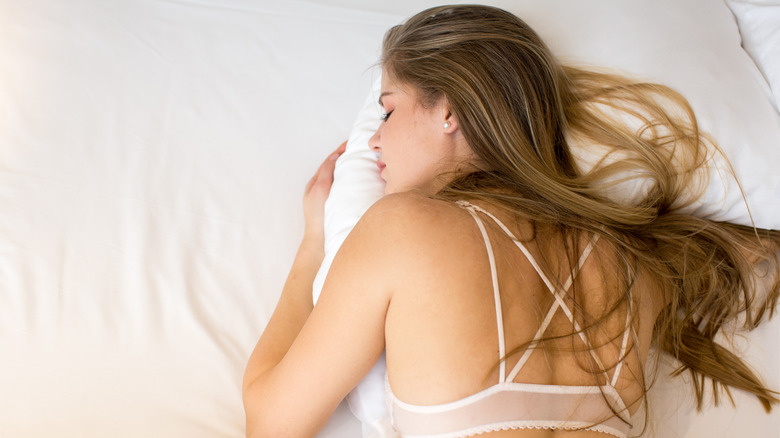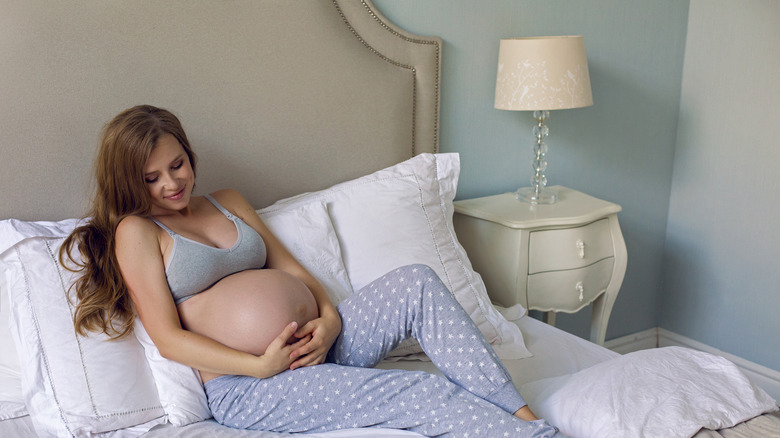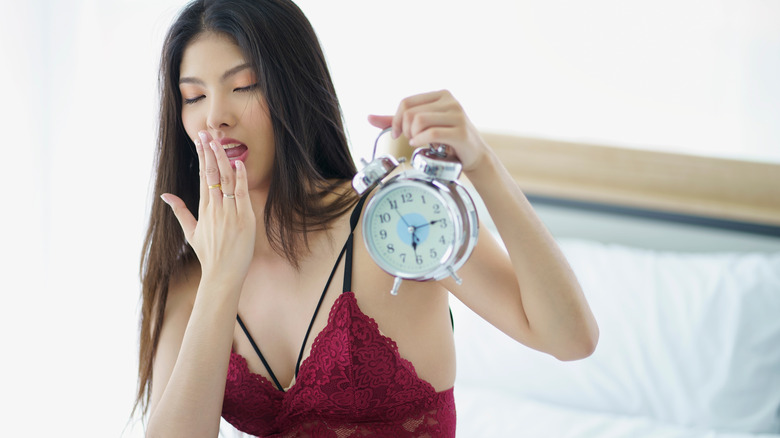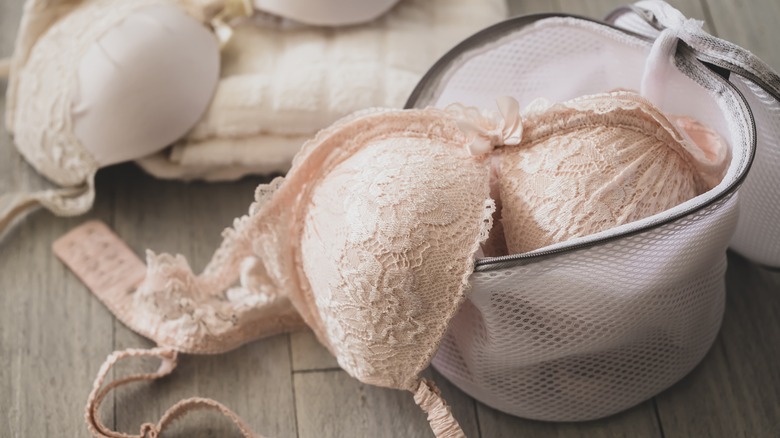When You Sleep In Your Bra, This Is What Happens
If you keep your breasts supported in a bra when you go to bed, you may wonder what it's actually doing to your breasts. Is it affecting circulation, is it putting you at risk for cancer, or is it actually preventing sagging? Well, none of the above. Let's take a look at the potentially negative effects of wearing a bra to bed first.
A study published in Cancer Epidemiology, Biomarkers & Prevention concluded that there was no risk of developing breast cancer associated with any aspect of bra-wearing, from the average number of hours worn daily, to whether the bra worn had an underwire, to the age at which a bra was first worn. In addition, there's no proof that wearing a bra while sleeping leads to poor blood circulation (per Healthline).
But if you're going to keep your bra on every night, be aware that there can be other effects. An improper, too-tight fit can lead to skin irritation, acne, and even unsettled sleep due to the discomfort. And if the cups don't tuck under the breasts properly, it's possible that fungal infection can develop in the fold, which may happen if skin is in constant contact with skin, as Dr. Regina Hampton, a board-certified breast surgeon, told Healthline.
Be sure you wash your bras often, as close-fitting undergarments tend to accumulate sweat, skin oils, and bacteria.
Are there any benefits to sleeping in your bra?
Unfortunately, just as there is no proof that nighttime bra-wearing causes cancer, there is nothing scientific to suggest that it keeps breasts from sagging. Attempts to prove that a bra prevents ligaments from "fatiguing" by offering additional support or, conversely, that its support allows breast tissue to grow weak and droopy, have yielded no results (via Byrdie). Sagging may instead be caused by any number of factors, such as genetics, gravity, up-and-down weight changes, pregnancy and breastfeeding, menopause, and exercising without a supportive bra.
Still, there can be benefits to sleeping in a bra. If your breasts become painful around your period or during pregnancy, or you're experiencing engorgement while breast-feeding or weaning, a soft bra can help reduce discomfort.
Even if none of the above applies to you, donning a bra in bed can just make you feel, well, comfy. The best choice for sleeping is one that's soft, flexible, and wire-free. Finally, be sure it fits just as well as your daytime bra. Both breasts should fit entirely within the cups, with the center of the bra positioned flat against your chest. The back of the bra should be on the second hook and the straps should be adjusted for your body. Now that's comfy enough to fall asleep in.
Be choosy about your sleepwear
Falling asleep in your bra might be your personal comfort choice, but your bra's fabric could influence your sleep quality. According to the Sleep Association, some fabrics are better than others, depending on your environment and how much you sweat. If you live in a humid environment or sweat at night, choose linen or silk for their breathability. Although cotton in your bra or your sleepwear is very breathable, it absorbs moisture and it isn't good for cooler conditions. Polyester doesn't absorb sweat at all, leaving your skin drenched.
A 2019 study in Nature and Science of Sleep studied how merino wool, cotton, and polyester affected sleep in women aged 50 to 70 years. Wearing wool allowed the women to fall asleep faster and have a better quality of sleep. Those who were typically poor sleepers woke up less often during the night while wearing wool.
The Sleep Association also suggested avoiding tight clothing with buttons or fasteners so that your body is free to move. Whether it's a bra or sleepwear, opt for nightwear that drapes and stretches easily.
The benefits of going braless
Who doesn't enjoy the freedom of coming home and removing the girls from their confines? Some bras dig into your back and leave awful grooves on your shoulders. Some bra fabrics, though pretty, can chafe and itch when you wear them too long (via Bustle). Celebrities such as Kendall Jenner and Rihanna have championed the freedom of going braless, even when in public (via Healthline).
Although wearing a bra doesn't necessarily hurt you, a 2013 study by a French sports science professor (via Medical News Today) found that bras don't do much for the breasts. The researcher, Jean-Denis Rouillon, studied the breasts of 320 women over 15 years, noting any changes in size and shape. He found that women who chose to toss their bras had a 7-millimeter lift in their nipples. Rouillon concluded that bras prevent the growth of supportive muscle tissue in women younger than 35, according to Healthline. He advised lifelong bra wearers to continue doing so since they wouldn't see much benefit, however.




